|
|
|


|
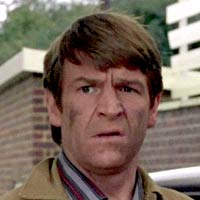 |
|
Image © ITV Studios,
1969 |
| |
John Walker
Character & Episode:
Mechanic in
You Can Always Find a Fall
Guy
John Walker was a supporting
actor who occasionally appeared on screen. His most high profile role was arguably that of Private
West in the BBC science-fiction serial Quatermass and the Pit
(1958-59).
Other television appearances followed in The Big Pull,
Dixon of Dock Green, Z Cars, Dr Finlay's Casebook,
Adam Adamant Lives! and in the comedy series George and
the Dragon which starred Sid James, Peggy Mount and John Le
Mesurier. John's role as the mechanic in Randall and
Hopkirk (Deceased) is his last known screen credit.
|
|
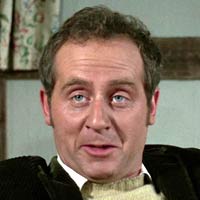 |
|
Image © ITV Studios,
1969 |
| |
Gary Watson
Character & Episode:
Donald Seaton in
The Smile Behind the Veil
Born: 13/06/1930, Shifnal, Shropshire, England (as
Garrowby Cawthorne Watson)
Well educated, Gary
Watson graduated from Cambridge University in the Fifties and taught
English at Westminster City School. He was very popular with the
pupils and, besides acting, directed some memorable school plays such as
Treasure Island, which starred a young Ken Phillips as
Doctor Trelawny. Gary made his television
debut in an Associated-Rediffusion Play of the Week
called The Last Enemy (transmitted live on 10th October
1956).
Gary spent the next several years learning
his trade, almost entirely on radio and the stage. In 1957, he
made his West End debut at the Phoenix Theatre in Camino Real,
directed by Peter Hall with whom he had worked whilst at
Cambridge. It was in 1961 that Gary began to make his first
regular steps into television in such series as The Avengers.
Later, he played Aramis in the BBC serial adaptation of The
Three Musketeers (1966-67). The cast also included Brian
Blessed and Jeremy Brett. Gary also made contributions to The
Baron, The Saint and Doctor Who during this
period of his career. In 1970, he starred in the Thames
Television adaptation of Macbeth playing Macduff. In 1972
and 1973 he appeared alongside Anthony Hopkins in the sprawling
BBC serialisation of Tolstoy's War and Peace. His final
screen appearance would come in 1988, in Hannay.
Gary was also much employed as a
reader and narrator in radio productions throughout his career,
worked on British Transport Films, featured in dozens of commercials
in the 1980s and 1990s, with his appearances in advertisements for Lloyds Bank and Nescafe
coffee being well remembered.
In his personal life, he was married to
Elsje Jacobsson (1940- ).
|
|
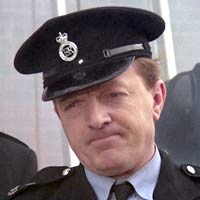 |
|
Image © ITV Studios,
1969 |
| |
Kenneth Watson
Character & Episode:
Police Sergeant in Just for the Record
Born: 16/11/1931, London, England (as
Kenneth Murray Watson)
Died: 21/07/1998, London, England
Kenneth Watson found his métier when his
English master persuaded him to join the school's Shakespeare
society. Subsequently, he studied at the Royal Academy of
Dramatic Arts and, following his graduation in 1953, began his
professional career by working in repertory theatres.
In his acting career, Kenneth made well
over one hundred and fifty screen appearances. In some productions,
including Randall and Hopkirk (Deceased), he was credited
as Ken Watson, though for most of his career he worked as
Kenneth Watson. He contributed to several notable programmes,
starting with the BBC children's adventure serial Kidnapped
in 1956. The production was in fact a remake of an adaptation of
Robert Louis Stevenson's novel which had previously been made by
the BBC in 1952. In 1960, Kenneth was a regular cast member in
two ATV Sunday afternoon serials which are now largely
forgotten: Formula for Danger and Mill of Secrets.
Other, more well-known, series that he would regularly
contribute to included Emergency Ward 10, Dixon of
Dock Green, Crown Court, Emmerdale and
Coronation Street. He also guested in series such as
Doctor Who (The Wheel in Space, 1968), Timeslip
(The Wrong End of Time, 1970), The Protectors (The
Bodyguards, 1972) and The New Avengers (K is for
Kill, 1977). His last regular screen role was as Brian Blair
in the Scottish Television soap opera Take
the High Road.
Kenneth's big screen work was limited to a
small number of productions, not all of which were credited
roles. He was, however, credited for his work on the second
Doctor Who spin-off film, Daleks' - Invasion Earth 2150
A.D. (1966), playing Craddock, a Dalek slave, and Sky
Pirates (1977), for the Children's Film Foundation, in which
he appeared as a police sergeant.
In his personal life, Kenneth was married
to Joan Foxall. The couple had two children, Jamie and Katy.
Sadly, Kenneth died of pancreatic cancer in 1998 aged 67.
|
|
David Webb
Character & Episode:
Police Sergeant in Who Killed Cock Robin?
Born: 06/03/1931, Luton, Bedfordshire, England (as
David Alec Webb)
Died: 30/06/2012, Clapham, London, England
Once a familiar screen face, David Webb was a busy actor,
chalking up more
than
one hundred film and television credits during his career. He
attended Luton Grammar School, where he acted in school
plays and rose to become Head Boy before he left in 1950. Soon
after, he served his National Service as an instructor in the
Royal Army Educational Corps, and returned to civilian life in
1952. In the same year, he went to study at RADA, from which he
graduated in 1954, though in later years he expressed regret at
having attended a drama school: "The sad thing is," he told
The Hull Times in 1971, "I had already been given the
opportunity to go into rep straight away, but I said, 'Oh, no I
have got to get some training.' But when a director asks you
what you've been doing, what good is a diploma, really?" His first
professional acting job was with the York Repertory Company and
this led to him later joining other such companies, including
ones in Scarborough, Richmond and Bromley.
Gradually, he came to notice and began to
be cast in supporting roles on television by the 1950s, and
featured as Private Wilson in Yesterday's Enemy, a
hard-hitting and well-received 1958 BBC play concerning British
war crimes in Burma during the Second World War, which was
remade for the cinema by Hammer Films a year later. David contributed to many well-known series including The Avengers
(The Springers, 1961),
Coronation Street, Doctor Who (Colony in Space,
1971), The New Avengers (Faces, 1976)
and Tales of the Unexpected.
David also became an ardent
opponent of censorship: in 1976 he helped found the National
Campaign for the Reform of the Obscene Publications Act (NCROPA)
and would for the rest of his life campaign in support of this
cause. In 1983 he stood against the then Prime Minister Margaret
Thatcher at her seat in Finchley in the General Election. His
work led him to make many television and radio appearances
regarding phone-ins and debates. He often contributed articles
to magazines and periodicals and was at one time a member of the
governing Council of the British Actors' Equity Association. His
hobbies included painting and classical organ music. David died in 2012 of pancreatic
cancer.
|
|
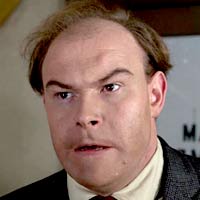 |
|
Image © ITV Studios,
1969 |
| |
Timothy West
Character & Episode:
Sam Grimes in Vendetta for a Dead Man
Born: 20/10/1934, Bradford, West Yorkshire, England
(as Timothy Lancaster West)
Died: 12/11/2024, London, England
Timothy West was for more than sixty years an acclaimed and versatile British character actor who had made well
over one hundred screen appearances in addition to his long and
successful career in the theatre. He was born into an acting
family – his father Harry Lockwood West (1905-89) was a well-known
actor who worked as Lockwood West for many years – and was educated at The John Lyon School,
a boys' independent school in Harrow on the Hill, London, and
Bristol Grammar School in Bristol, where he was a classmate of
fellow actors Julian Glover and Dave Prowse, and at the Regent Street Polytechnic (now the
University of Westminster).
After completing National Service in 1954,
Timothy took a job as an office furniture salesman in Holborn,
London. Then, until 1956, he was a quality control engineer in
the new recorded tapes department at EMI in Hayes, Middlesex. He
had by then joined several amateur dramatic societies. Timothy’s
professional stage career started as an assistant stage manager
and actor at the Wimbledon Theatre in 1956, and he
followed this with several seasons in repertory theatre. He
acted at the Piccadilly Theatre in 1959 and was with the Royal
Shakespeare Company in 1965 at Stratford, where he appeared in Love's Labour's Lost, The Jew
of Malta, The Merchant of Venice, The Comedy of Errors and Timon of Athens. He was also cast
in Peter Hall's outstanding production of The Government
Inspector at the Aldwych Theatre with Paul Scofield, and Eric
Porter.
Having spent many years as a character
actor, he was catapulted to fame as star of
the major television series, Edward the Seventh (1975),
in which he played the title role and his real-life sons, Samuel
and Joseph, played the King's children. Other major roles have
included parts in the feature films Nicholas and Alexandra
(1971), The Day of the Jackal (1973), The Thirty Nine
Steps (1978), Masada (1981) and Cry Freedom
(1987).
In a lighter vein, Timothy starred as
patriarch Bradley Hardacre in Granada TV's satirical Northern
super-soap Brass throughout three seasons (1983–1990), and
made a memorable appearance as the manic and aptly-named
Professor Furie in A Very Peculiar Practice in 1986. From
2001-2003, he played the grumpy and frequently volatile Andrew
in the BBC drama series Bedtime, with Sheila Hancock
playing his long-suffering wife, Alice. At Christmas 2007, he
joined the cast of sitcom Not Going Out as recurring
character Geoffrey Adams, the father of two central characters,
reprising this role in further two episodes.
Timothy was also a prolific performer
in radio productions and was for some time a member of the BBC
Radio Drama Repertory Company. His voice was also heard on the many audiobooks that he
recorded over the years. However, his work in the performing
arts and beyond was not limited to acting. He was artistic
director of the Forum Theatre, Billingham, in 1973, and
co-artistic director of the Old Vic Theatre from 1980–81, was president of the London Academy
of Music and Dramatic Art, president of the Society for
Theatre Research, a supporter of the charity Cancer
Research UK, and was also an Ambassador of SOS Children's
Villages, an international orphan charity providing homes and
mothers for orphaned and abandoned children. In his later years,
he actively supported the charity's annual World Orphan Week campaign which
takes place each February.
In his personal life, Timothy was first
married to actress Jacqueline Boyer from 1956 to 1961 and they
had a daughter, Juliet. He married again in 1963 to Prunella Scales (1932-), an actress who
will always be remembered for her role as Sybil Fawlty in
Fawlty Towers, the classic comedy written by John Cleese and
Connie Booth. Timothy and Prunella were each awarded a CBE
– Timothy's being awarded in 1984 and Prunella's in 1992. One of
their
sons, Samuel West (1966-), also became a successful actor, and the
couple also had another son, Joseph, and a daughter, Juliet.
When in her 70s, Prunella was diagnosed with Alzheimer's
Disease and the couple were very much in the public eye
during her illness, fronting a popular Channel 4 television show
about their love of canal boat excursions, Great Canal Journeys
(2014-2019). Both Timothy and Prunella were keen narrowboaters
and both spoke frankly about her dementia during the series,
which was praised by Alzheimer’s Research UK. Timothy also wrote several books, including his autobiography, A Moment
Towards the End of the Play (Nick Hern Books, 2001).
|
|
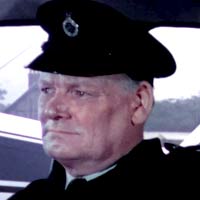 |
|
Image © ITV Studios, 1969 |
| |
Bill Westley, Sr.
Character & Episode:
Police Driver in A Sentimental Journey, The
Man from Nowhere, Could You Recognise the Man Again? and
Somebody Just Walked Over My Grave
Bill Westley Sr., the uncle of assistant
director Bill Westley (1939-), worked as an extra in film and
television and never received an on-screen credit for his work.
He often played policemen and was called upon many times to
appear in ITC productions. His most prolific period working as
an extra was between 1963 and 1967 when Bill made a large number
of background appearances in The Saint and Gideon's
Way. His final identified television role was in the
Columbia Pictures Television production Ivanhoe (1982),
which was filmed in the United Kingdom.
|
|
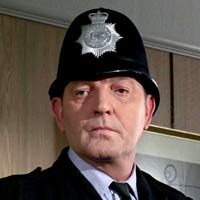 |
|
Image © ITV Studios, 1969 |
| |
Philip Weston
Character & Episode:
Constable Johnson in Whoever Heard of a Ghost Dying?
Besides his role in Randall and Hopkirk
(Deceased), it is known that Philip Weston also appeared in
Doctor Who (two separate characters in The Sea
Devils, 1972), Doctor in Charge (2 episodes, also
1972) and Get Some In! (as a RAF Regiment member in the
episode commonly known as 'Field Exercise', 1976). He
almost certainly appeared as an extra in other productions.
|
|
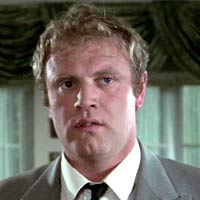 |
|
Image © ITV Studios, 1969 |
| |
Les White
Character & Episode:
Hales in A Disturbing
Case
Born: 1934, Surrey, England (as Leslie Philip David
White)
Died: 20/07/2009, Hove, East Sussex, England
Les White had been a boxer, a paratrooper
and a steeplejack before becoming involved in professional stunt
work. To prepare himself for the rigours of his new profession he embarked
on a training programme which included fencing, diving,
gymnastics, pro-wrestling and archery classes. As a stuntman he
worked on major feature films such as Where Eagles
Dare (1968), Superman III (1983) and Batman
(1989). He also performed stunts in James Bond films including
The Living Daylights (1987), on which he stunt doubled
for actor Joe Don Baker.
Les very nearly lost his life on the
morning of 13th June 1966, when he was driving in London's West
End and had a serious car crash. After being cut from the
tangled wreckage he was rushed to St. George's Hospital where
his chances of survival were judged to be two to one against.
Defeating the odds, not only was Les out of hospital within a
week, but two days after his discharge he was also performing
stunt work on a new film!
Outside of his stunt work, Les appeared on screen as
an extra and an actor. On the big screen he was seen in films such
as Rasputin: The Mad Monk (1966) for Hammer Films, The Deadly Affair (1967) and
the Sherlock Holmes spoof Without a Clue (1988). He also
featured as a horse rider in Carry On Cowboy
(1965). On television, he made contributions to series such as
H.G. Wells' Invisible Man
(1959), The Baron (1967), The Avengers (1968), The Saint (1969)
and Space: 1999 (1977). His last credit as an actor came in 1991
when he played a pirate in episode of the television series
Zorro.
In his personal life, he was married to
Jean Carreras and had a daughter, Natalie.
|
|
Frank Windsor
Character & Episode:
John Sorrensen in My Late, Lamented Friend and
Partner
Born: 12/07/1928, Walsall, England (as Frank Windsor
Higgins)
Died: 30/09/2020, London, England
Born and bred in Walsall, Frank Windsor
attended the local Queen Mary's Grammar School. After military
service with the RAF, he trained as an actor at the Central
School of Speech and Drama. He left in 1952 to assist fellow
students and a number of friends from Oxford and Cambridge in
the formation of The Oxford and Cambridge Players (which was
soon renamed The Elizabethan Theatre Company), which was set up
with the idea of taking William Shakespeare's works on tour to
small towns and villages in Britain where the Bard's plays were
rarely seen. In addition to these places and Oxford and
Cambridge, the company also notably appeared in Cheltenham and
at the Edinburgh Festival. During the following two years, Frank
played in numerous stage productions with the Players before
joining the Manchester Library Theatre and then the
Oxford Playhouse, both in the mid-1950s. In 1957 he joined the BBC Drama Repertory
Company.
Frank began his career on radio soon after
the Second World War and made his television debut in 1953 in a
televised Elizabethan Theatre Company stage production of
Shakespeare's King Henry V. His first in-studio
television play followed two years later, when he played The
Crown Prince Rudolph of Austria in The Masque of Kings,
written by Maxwell Anderson, and broadcast live by the BBC on
Sunday 19th June 1955.
His most famous role was as John Watt in
Z Cars from 1962 to 1965, and thereafter its spin-off
Softly, Softly (later Softly, Softly Task Force) from
1966 to 1976. He returned to the parent series Z Cars for
its final episode in 1978. He was the subject of the
biographical TV series This Is Your Life in 1975. He has
also had regular roles in the BBC drama Casualty, the ITV
drama Peak Practice and he played Major Charlie Grace in
EastEnders (1992). He featured in two 1980s Doctor Who
stories - The King's Demons and Ghost Light. In
his personal life, he married Mary Corbett (1931-), a dancer.
They had two children, Amanda (born in 1961) and David
(1968-1997, who tragically died in car crash). Frank died at his
home in London in September 2020 at the grand old age of 92.
|
|
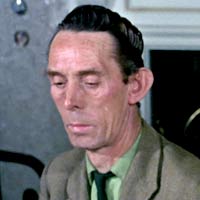 |
|
Image © ITV Studios, 1969 |
| |
Fred Wood
Character & Episode:
Second Man at Séance in The Trouble With Women
Born: 26/10/1921, Rotherhithe, London, England (as
Frederick Thomas Wood)
Died: 25/01/2003, Lewisham, London,
England
Fred Wood was a minor supporting actor who
started his career just before the Second World War and appeared
in a huge number of film and television productions, mainly as a
walk-on extra. His film appearances notably include From
Russia With Love (1963, as a gipsy), Daleks' Invasion
Earth 2150 A.D. (1966), Oliver! (1968), Dad's Army
(1971) and Star Wars (1977, as a 'local ugly' in the
cantina). On television, he made cameos in such series as
Danger Man, The Saint, The Baron and The
Sweeney. Fred worked at many of the major British film
studios such as Bray, Denham, Ealing, Elstree and Pinewood, and
with several legendary directors including Alfred Hitchcock,
Stanley Kubrick and George Lucas.
In his personal life, Fred was married. His
wife Joan also appeared in films and TV as an extra, sometimes
appearing in scenes with her husband, and the
couple had two children, son Michael and daughter Sandra. In film and TV industry, Fred was better
known as Fred Woods, even though he was credited as Fred Wood in
the television series Gone to Seed. His colleagues
nicknamed him "The Face".
|
|
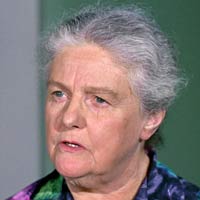 |
|
Image © ITV Studios, 1969 |
| |
Betty Woolfe
Character & Episode:
Martha in But What a Sweet Little Room
Born: 02/11/1901, Lambeth, London, England (as
Bertha Helen Sparks)
Died: 08/02/1982, Denville Hall, Northwood, London,
England
Londoner Betty Woolfe turned to screen
acting late in life, seemingly not making her debut until the
early 1950s. Consequently, most of the characters that she
played were of the late middle-age and elderly variety, usually
in supporting roles. She was also for a time manageress of the
old Lyric Theatre, Hammersmith. Her main credits were in series
such as Weavers Green, Crossroads and Jumbo
Spencer. She did not marry until she was 58 in 1960, and
sadly her new husband Francis Woolfe, who acted under stage name
Frank Woolfe, passed away just two years later. In common with
her But What a Sweet Little Room colleagues Frances
Bennett and Doris Hare, she died at the actors' residential care
home, Denville Hall.
|
|
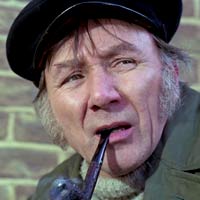 |
|
Image © ITV Studios, 1969 |
| |
Jack Woolgar
Character & Episode:
Old Man in Just for the Record
Born: 05/09/1913, Tolworth, Surrey, England
Died: 14/07/1978, Huddersfield, Yorkshire, England
Jack William Woolgar was a British character actor working
in television and film from the 1950s until his death in 1978.
He turned to acting in his early thirties in the later years of
the Second World War and turned professional shortly afterwards,
initially working in repertory theatre and touring the UK. He
acted on live television for the Granada ITV region during the
1950s, whilst at the Theatre Royal, Huddersfield.
Woolgar was often cast as vagrants and others down on their
luck, such as in The Avengers episode The Living Dead
- he had lifelong chest problems and he was able to produce a
bubbling, hacking cough at will. Prominent roles include the
coal miner father in Dennis Potter's political drama Stand
Up, Nigel Barton, and Sam 'Carney' Carne in the Midlands
soap opera Crossroads. He also played Professor Kirke in
the 1967 ABC Television serial of The Lion, the Witch and the
Wardrobe, the lighthouse keeper in Tom Grattan's War
in 1968, as well as Professor Branestawm in Thames Television's
The Incredible Adventures of Professor Branestawm (1969),
a series now sadly completely lost. Other appearances include
roles in Please Sir! (The Generation Gap), The
Onedin Line (The Hostage/Survivor), The
Sweeney (Jigsaw), old Joe Hargreaves in Whatever
Happened to the Likely Lads? (The Shape Of Things To Come)
1974, and Doctor Who (Sergeant Arnold in The Web of
Fear).
Jack was married to the RADA trained actress Elizabeth Mann
(1920-1980) and the couple had four children. One of them, Tim,
runs a website dedicated to documenting his father's life and
career:
www.jackwoolgar.org.uk.
|
|
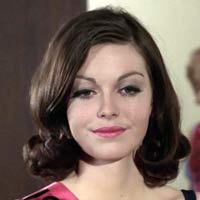 |
|
Image © ITV Studios, 1969 |
| |
Katya Wyeth
Character & Episode:
Miss Budapest in Just for the Record
Born: 01/01/1948, Rochford, Essex, England (as
Catherine S. Wyeth)
Born the daughter of an English solicitor,
Rex Wyeth (1914-1978), and German mother who was a ballerina,
Katya Wyeth would later claim to a journalist that there was
also Polish and Russian blood in her family line. She received
her education in Essex, England and Hamburg, West Germany.
Inspired by her mother, Katya’s first stage engagement was as a
dancer at the Theatre Royal, Windsor. However, when her height
(5' 9") proved to be a problem, she instead turned to modelling,
and then started to concentrate on acting. She spent several
years in repertory theatre, playing with the National Youth
Theatre, and later featured in productions including Dear
Charles (in the late 1960s) and Rebelais at London’s
Round House (in 1971). She also worked for a time as an
assistant stage manager and understudy and acted in a German
film and on German television.
Katya's British screen career properly commenced in
the late 1960s, although she had been seen on BBC Television in
1964 in a play televised from the Ashcroft Theatre, Croydon, a
modern-dress adaptation of Shakespeare's Julius Caesar.
At this time, she was working as Katherina Wyeth. By the late
1960s, she
was being credited as Kathja Wyeth, and Randall and Hopkirk
(Deceased) marked one of the last times that she was
credited in this way. She settled on Katya Wyeth later in 1969
and employed this stage name for the rest of her acting career. On
television, she made contributions to series such as The
Avengers (1969), Monty Python’s Flying Circus (1969),
The Goodies (1970 and 1971), The Sweeney (1976)
and Space: 1999 (1977). She was also hostess of the game
show The Sky's the Limit (from 1971 to 1972), which was
presented by Hughie Green.
Katya’s feature film contributions include
the horror films
Hands of the Ripper (1971), Twins of Evil (1971),
which featured Peter Cushing and the Collinson twins, and
Burke and Hare (1972). Her role in Stanley Kubrick's
legendary A
Clockwork Orange (1971) witnessed her rollicking with
Alex (Malcolm MacDowell) in the 'Ascot fantasy' sequence that
closes the film. As the 1970s progressed and the British Film
Industry fell into a decline, many projects on offer to
British-based actors were lowest-common-denominator exploitation
films, and Katya was featured in two of them, the sex-comedies Confessions of a Window Cleaner
(1974) and I'm Not Feeling Myself Tonight (1976). Her
last screen credit was in the film No. 1 of the Secret
Service (1977), a tepid James Bond spoof which was directed by Lindsay Shonteff
and inexplicably led to two sequel films.
In her personal life, Katya was married to
actor Michael Bangerter (1936-2016) from 1971 until his death.
The couple had two children, a son and a daughter.
|
Section compiled by Darren Senior
Additional research and presentation by Denis Kirsanov and Alan Hayes
|
|
|
Back to Top |
|



